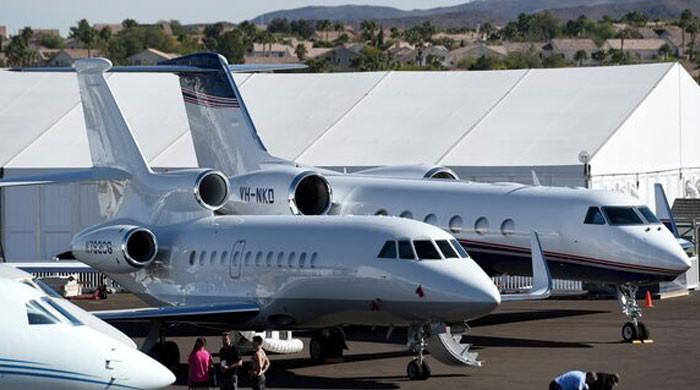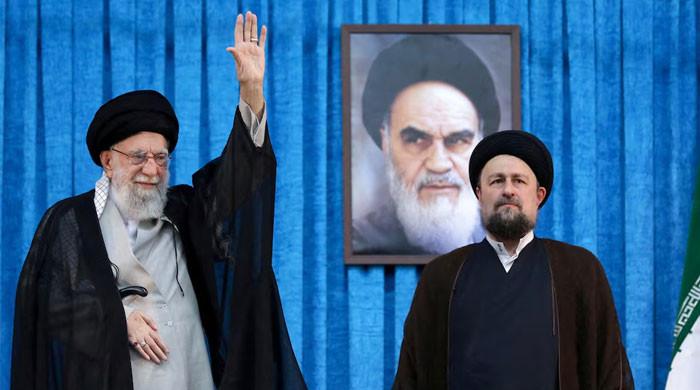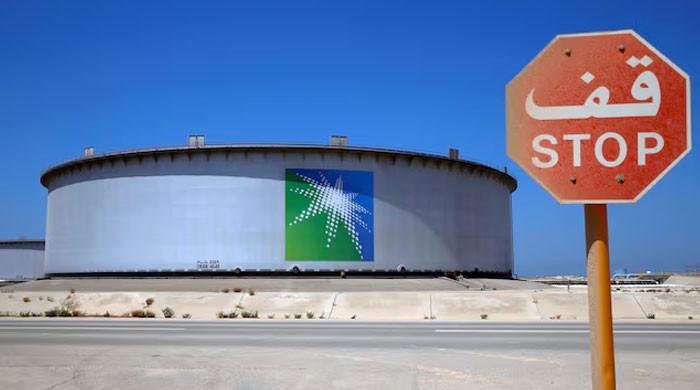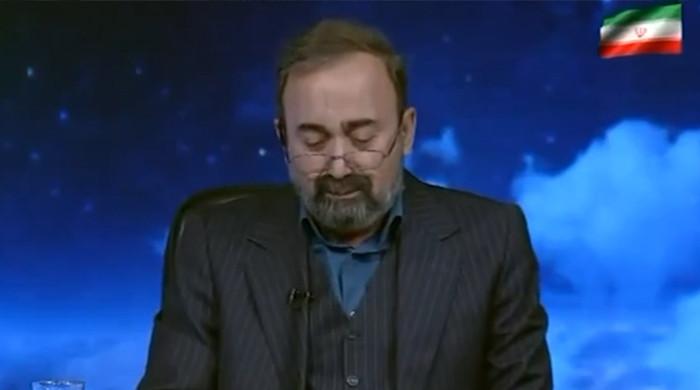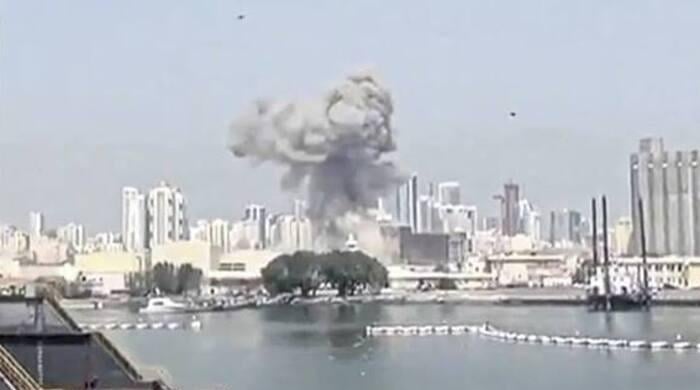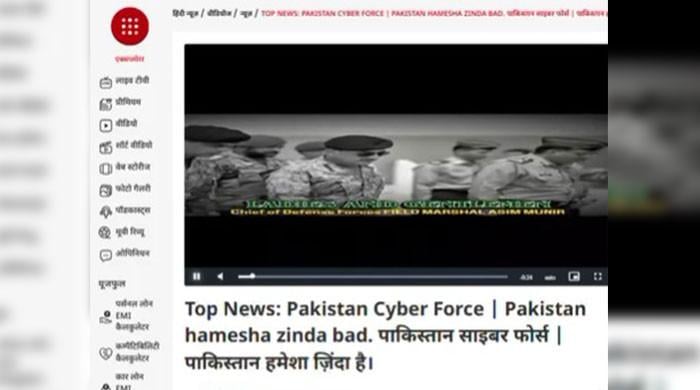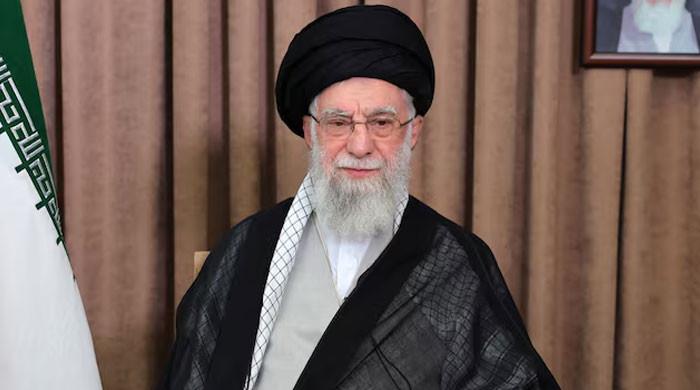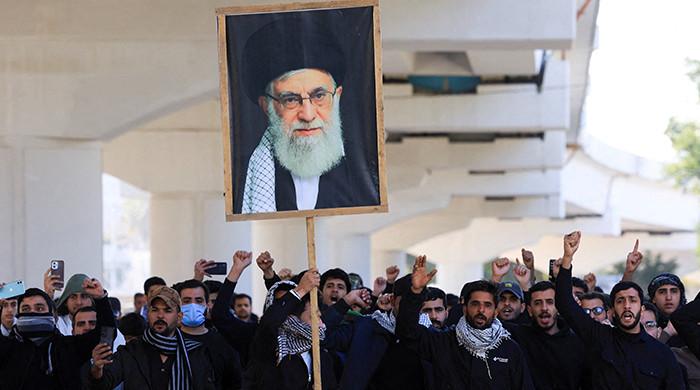Strengthening, stabilising current Afghan govt 'only way' forward: PM Imran Khan at UNGA
PM Imran Khan also speaks about India's "reign of terror", need to convene dialogue on countering Islamophobia
September 25, 2021
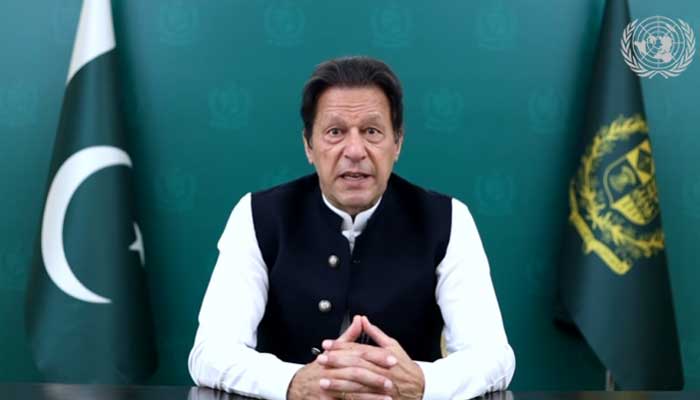
- Prime Minister Imran Khan says stabilising, strengthening current Afghan govt "only way forward" for the sake of the Afghan people.
- Urges UN secretary-general to convene a global dialogue on countering the rise of Islamophobia.
- Highlights India's "reign of terror" in occupied Kashmir; calls on India to reverse August 5 measures, stop rights violations and demographic changes in occupied Kashmir.
NEW YORK: Prime Minister Imran Khan early Saturday delivered his address to the 76th session of the General Assembly of the United Nations, where he stressed on the need for the world to recognise that the "only way" forward when it comes to Afghanistan is to "strengthen and stabilise the current government".
He said this is imperative "for the sake of the people of Afghanistan".
"Right now the whole international community should think what is the way ahead. There are two paths that we can take. If we neglect Afghanistan right now, according to the UN half the people of Afghanistan are already vulnerable, and by next year almost 90% of the people in Afghanistan will go below the poverty line.
"There is a huge humanitarian crisis looming ahead. And this will have serious repercussions not just for the neighbours of Afghanistan but everywhere," he said.
PM Imran Khan said that a destabilised, chaotic Afghanistan "will again become a safe haven for international terrorists", pointing out that this is why the US came to Afghanistan in the first place.
"Therefore, there is only one way to go. We must strengthen and stabilise the current government, for the sake of the people of Afghanistan."
'Incentivise the Taliban'
The premier provided a recap of what the Taliban have promised in their media briefings.
He said that they have promised to respect human rights, have an inclusive government, not allow their soil to be used by terrorists, and they have given amnesty.
"If the world community incentivises them, and encourages them to walk this talk, it will be a win-win situation for everyone. Because these are the four conditions that the US-Taliban dialogue in Doha was all about," PM Imran Khan said.
He said that if they are incentivised to go in this direction, then the 20 years the coalition forces spent in Afghanistan will not be for naught.
"Because the Afghan soil would not be used by the international terrorists."
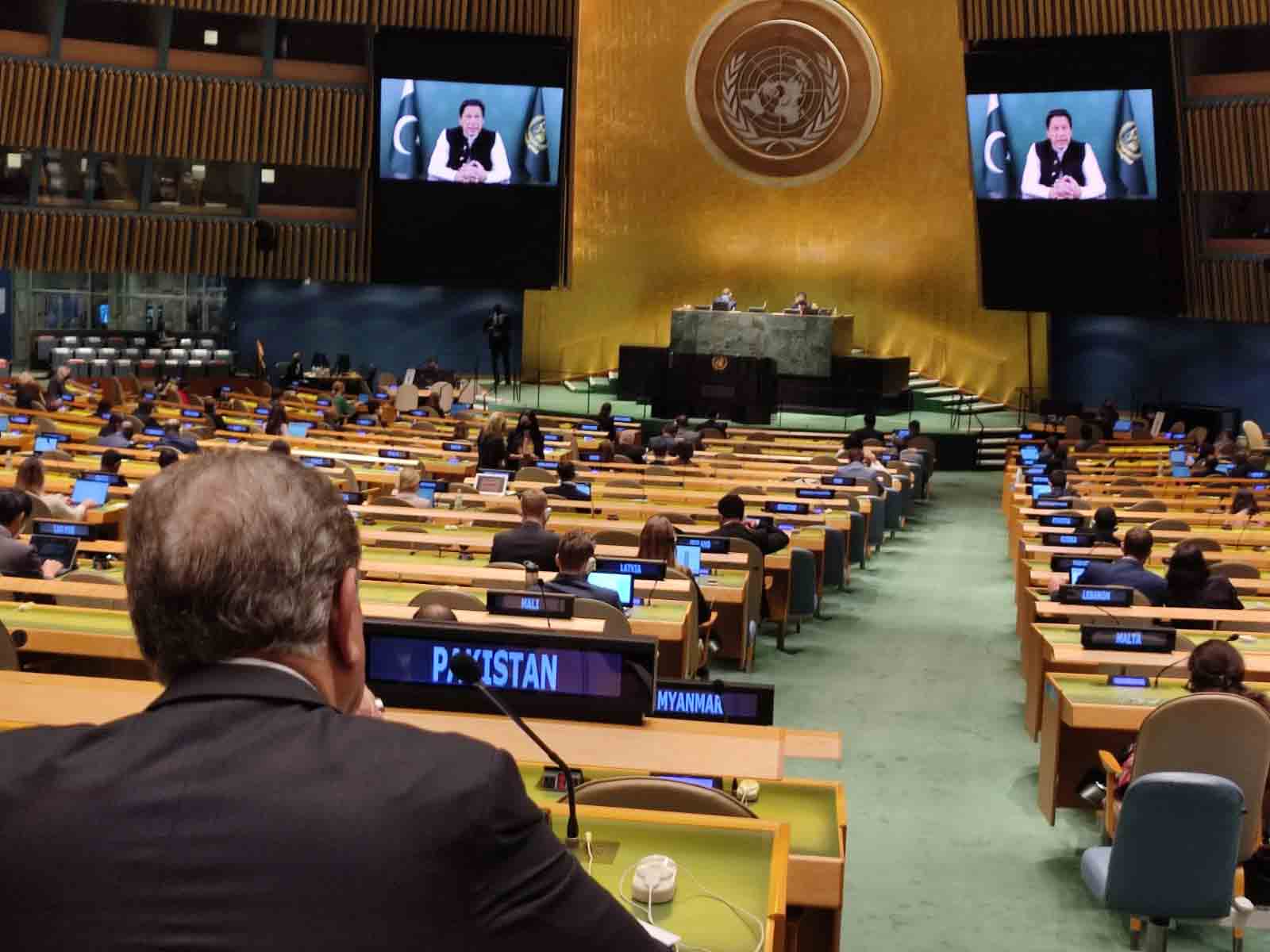
Time is of the essence
The prime minister went on to underscore that time is of the essence as Afghanistan is at a "critical" juncture.
"You cannot waste time. Help is needed there. Humanitarian assistance has to be given there immediately. The Secretary General of the United Nations has taken bold steps. I urge you to mobilise the international community, and move in this direction," he said.
Islamophobia
The premier also discussed Islamophobia, which he noted that the UN Global Counter Terrorism Strategy has recognised as an emerging threat, as it increases the tendency of right-wing, xenophobic and violent nationalists, extremists and terrorist groups to target Muslims.
"We hope the Secretary-General’s report will focus on these new threats of terrorism posed by Islamophobes and right-wing extremists," the prime minister said.
"I call on the Secretary-General to convene a global dialogue on countering the rise of Islamophobia. Our parallel efforts, at the same time, should be to promote interfaith harmony, and they should continue," he added.
The premier also spoke in particular about Islamophobia in India, which he said "now rules" the country.
"The hate-filled ‘Hindutva’ ideology, propagated by the fascist RSS-BJP regime, has unleashed a reign of fear and violence against India’s 200 million strong Muslim community," he said.
"Mob lynching by cow vigilantes; frequent pogroms, such as the one in New Delhi last year; discriminatory citizenship laws to purge India of Muslims; and a campaign to destroy mosques across India and obliterate its Muslim heritage and history, are all part of this criminal enterprise," the premier said.
India's 'reign of terror'
The prime minister went on to underscore how New Delhi has also embarked "on what it ominously calls the 'final solution' for the Jammu and Kashmir dispute".
He said India has:
- undertaken a series of illegal and unilateral measures in occupied Jammu and Kashmir since August 5, 2019;
- unleashed a reign of terror by an occupation force of 900,000;
- jailed senior Kashmiri leadership;
- imposed a clampdown on media and internet;
- violently suppressed peaceful protests;
- abducted 13,000 young Kashmiris and tortured hundreds of them;
- extra-judicially killed hundreds of innocent Kashmiris in fake “encounters”; and
- imposed collective punishments by destroying entire neighbourhoods and villages.
The prime minister drew attention to a detailed dossier on gross and systematic violations of human rights by the Indian security forces in occupied Jammu and Kashmir, which was unveiled recently by Pakistan.
He noted how India's repression is accompanied by illegal efforts to change the demographic structure of the occupied territory, and transform it from a Muslim majority into a Muslim minority.
"Indian actions violate the resolutions of the UN Security Council on Jammu and Kashmir. The resolutions clearly prescribe that the 'final disposition' of the disputed territory should be decided by its people, through a free and impartial plebiscite held under the UN auspices," the premier reminded the Assembly.
"India’s actions in occupied Jammu and Kashmir also violate international human rights and humanitarian laws, including the 4th Geneva Convention, and amount to war crimes and crimes against humanity," he added.
The premier regretted that the world’s approach to violations of human rights "lacks even-handedness, and even is selective".
"Geopolitical considerations, or corporate interests, commercial interests often compel major powers to overlook the transgressions of their 'affiliated' countries," he remarked.
He said that such "double standards" are the "most glaring in case of India", where the RSS-BJP regime is being allowed to get away with human rights abuses with complete impunity.
PM Imran Khan cited the forcible snatching of the mortal remains of the great Kashmiri leader, Syed Ali Shah Geelani, from his family, denying him a proper Islamic funeral and burial, in accordance with his wishes and Muslim traditions, as the most recent example of Indian barbarity.
"Devoid of any legal or moral sanction, this action was even against the basic norms of human decency," he said, adding: "I call on this General Assembly to demand that Syed Geelani’s mortal remains be allowed to be buried in the Cemetery of Martyrs with the appropriate Islamic rites."
Pakistan desires peace with India, neighbours
The prime minister said Pakistan desires peace with India, as with all its neighbours. "But sustainable peace in South Asia is contingent upon resolution of the Jammu and Kashmir dispute, in accordance with the relevant United Nations Security Council resolutions, and the wishes of the Kashmiri people," he said.
PM Imran Khan stated for the record that last February, both countries reaffirmed the 2003 ceasefire understanding along the Line of Control.
"The hope was that it would lead to a rethink of the strategy in New Delhi. Sadly, the BJP government has intensified repression in Kashmir and continues to vitiate the environment by these barbaric acts," the premier said.
He said the onus remains on India to create a conducive environment for meaningful and result-oriented engagement with Pakistan.
He called upon India to:
- Reverse its unilateral and illegal measures instituted since August 5, 2019;
- Stop its oppression and human rights violations against the people of Kashmir; and
- Halt and reverse the demographic changes in the occupied territory.
The prime minister also warned of another conflict between Pakistan in India, which he said is essential to prevent. "India’s military build-up, development of advanced nuclear weapons, and acquisition of destabilising conventional capabilities, can erode mutual deterrence between the two countries," he said.
'Triple challenge'
Earlier, at the outset of his address, the prime minister shed light on how the world faces a "triple challenge — the COVID-19 crisis, the accompanying economic crisis and the threats posed by climate change".
"The virus does not discriminate between nations and people, nor do the catastrophies imposed by uncertain weather patterns," he said.
The premier that the common threats faced by the world today not only expose the "fragility of the international system" but also underscore the "oneness of humanity".
Speaking of Pakistan's pandemic response, he said that the country has been "successful so far in containing the COVID pandemic".
"Our collaborated strategy of smart lockdowns helped saved lives and livelihood and kept the economy afloat," he said, also highlighting the social-safety Ehsaas Programme, which he said helped 15 million families survive.
Turning his focus to climate change, he termed it one of the "primary existential threats" that the world faces today. He said although Pakistan's contribution to global emissions is negligible, it is among the 10 countries that are most vulnerable to the effects of climate change.
He then spoke about Pakistan's "game changing" Billion Tree Tsunami tree plantation programme for reforestation, preservation of natural habitats, switching to renewable energy, removing pollution from cities and adapting to impacts of climate change as the ways the country has resolved to fulfil its "global responsibility".
PM Imran Khan proposed that to address the triple crisis of the COVID-19 pandemic, economic downturn and climate emergency, the following strategy be implemented:
- Vaccine equity - everyone, everywhere must be vaccinated and as soon as possible.
- Adequate financing - made available to developing countries, through comprehensive debt restructuring, expanded ODA, redistribution of unutilised SDRs and allotment of a greater proportion of SDRs to developing countries, besides provision of climate finance.
- Clear investment strategies - which help alleviate poverty, build sustainable infrastructure, and bridge the digital divide.
The prime minister proposed that the secretary general convene an SDG Summit in 2025 to review and accelerate implementation of sustainable development goals.
'Scourge of illicit financial flows'
The premier also spoke of the "scourge of illicit financial flows", which he said is an issue he has often highlighted at the United Nations.
He said that the Secretary General’s High-Level Panel on Financial Accountability, Transparency and Integrity (FACTI) has calculated that a "staggering $7 trillion in stolen assets are parked in the financial haven destinations".
Highlighting the consequences for developing nations, he said that it "depletes their already meagre resources, accentuates the levels of poverty especially when laundered money puts pressure on the currency and leads to its devaluation".
"At the current rate, when the FACTI Panel estimates that $1 trillion every year is taken out of the developing world, there will be mass exodus of economic migrants towards the richer nations," he stressed.
He said retrieving the stolen assets from the developed countries is "impossible for poor nations".
The prime minister called upon the General Assembly to take steps meaningfully to address this "deeply disturbing, and morally repugnant, situation".
"Naming and shaming the ‘haven’ destinations and developing a comprehensive legal framework to halt and reverse the illicit financial flows are most critical actions to stop this grave economic injustice," he said.
"And at a minimum, the recommendations of Secretary General's FACTI panel should be fully implemented," he added.
The 76th UNGA session
This year's theme is titled: "Building resilience through hope – to recover from COVID-19, rebuild sustainably, respond to the needs of the planet, respect the rights of people, and revitalise the United Nations”.
The debate, due to the COVID-19 pandemic, is being held in a hybrid fashion, meaning that heads of state or government representatives may elect to deliver their speech live from the General Assembly Hall or have a delegate introduce a pre-recorded video statement.
The Pakistan delegation, comprising Minister for Foreign Affairs Shah Mahmood Qureshi, Ambassador to the UN Munir Akram, and Chairman Parliamentary Committee on Kashmir Shehryar Afridi, arrived at the Assembly Hall prior to the address.
Later, Qureshi introduced the prime minister's pre-recorded address to the Assembly.
— With input from Ayaz Akbar Yousufzai in Islamabad.




